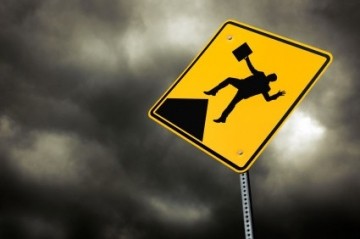Fiscal Cliff Could Mean $2,200 More in Taxes for Worcester Families
Wednesday, November 21, 2012

Unless Congress can pass a budget deal by the end of December, the first days of January 2013 will bring much more than just a new year to Massachusetts residents. The Bush-era tax cuts of 2000 and 2002, as well as the payroll tax cut of 2010 are all set to expire on the first of the new year in what some have termed "Taxmageddon."
In addition, mandatory budget cuts to federal discretionary spending in both defense and non-defense sectors would kick in as part of the sequestration measures included in the Budget Control Act of 2011.
Mass Effects
According to Robert Nakosteen, a professor at UMass-Amherst's Isenberg School of Management and executive editor of the economic journal MassBenchmarks, the Commonwealth will feel negative effects from both sides of the fiscal cliff. The tax increases, which will take money out of everyone's hands, will lead to less retail sales and less consumer spending thereby having a depressing effect on the Massachusetts economy.
The spending cuts due to sequestration, half of which will affect defense spending, will also have a direct negative effect on the Bay State, said Nakosteen.
"The effect on the state would be disproportionately large compared to other states because of the large amount of defense spending, especially in high-tech areas."
Defense companies in Massachusetts generate nearly $9 billion in payroll each year and more than $3 billion in tax revenue, according to a 2010 report by the UMass Donahue Institute for Economic & Public Policy Research.
If the state economy slows down due to decreased consumer spending and cuts in federal contracts to defense firms, state tax revenues will take a hit as well, which is where municipalities will feel the effects of the fiscal cliff the most.
"Maybe the most important source of local funding is intergovernmental transfers," Nakosteen said. "Any time state tax revenues decline, those transfers come under threat."
Victor Matheson, an associate professor of Economics at Holy Cross, said the non-partisan Congressional Budget Office (CBO) has estimated that going over the fiscal cliff will result in about $400 billion in additional taxes.
"That's going to be around a 20 percent increase in the typical person's tax bill," he said.
"If we put that in terms of a typical Worcester family of four earning about $60,000 a year, they can expect their tax bill to rise about $2,200 for the year."
Another issue that Matheson pointed out was the end to the so-called "doc fix" for Medicare. In an attempt to rein in healthcare costs, Medicare has lower payments for doctors built into its payment structure. The doc fix fills in the gap. Without it, doctors at UMass Memorial or St. Vincent could see lower reimbursements for the treatment of Medicare patients.

The View From the Edge

While the CBO has said that if all the provisions of the fiscal cliff go into effect, it would be sufficient to send the national economy back into recession and send the unemployment rate up over 9 percent, Matheson is decidedly more optimistic.
"My sense is that this is an easy thing to fix."
If lawmakers allow all the tax cuts to expire on January 2, they can still come back on January 3 and vote for new tax cuts to balance them out.
"A week of higher payroll taxes isn't going to hurt anybody," said Matheson.
At the same time, a number of the sequestration measures, including the cuts to defense spending, are set to phase in fairly slowly over time and may not have any large immediate effects.
"Fiscal cliff is probably the wrong term," he said. "It's more like a fiscal slope."
Democrats may have the upper hand on Republicans, who have refused a deal to raise taxes on individuals making over $250,000 a year, when they step to the negotiating table in the coming weeks, and Lieutenant Governor Tim Murray was confident earlier this week that the fiscal cliff could be averted if Congress is willing to take the necessary action.
"The American people voted to keep moving forward and they voted for action," he said in reference to President Barack Obama's reelection.
"This includes working together to deliver a real solution to address the deficit. President Obama has proposed a fair and balanced approach – including asking those who earn more to pay their fair share, and extending tax cuts for families making less than $250,000 a year. This approach makes sense and would prevent taxes from going up for 98 percent of Americans and 97 percent of all small businesses. I urge Congress to act quickly to reach an agreement.”
Related Articles
- MA Taxpayer Group Says Closing Loopholes Won’t Boost Revenues
- Could $100 Million Rail Deal Jump Start Worcester’s Economy?
- Worcester Activists Reinventing Local Economy
- Worcester Economy Stuck In Neutral
- 2400 Property Owners File For Tax Abatements
- MA Property Taxes Among Nation’s Worst For Businesses




Follow us on Pinterest Google + Facebook Twitter See It Read It